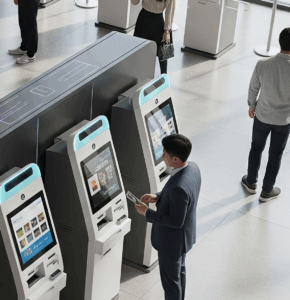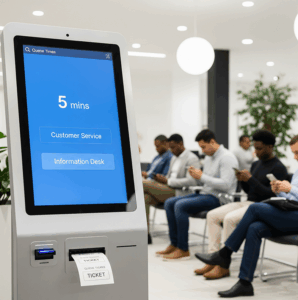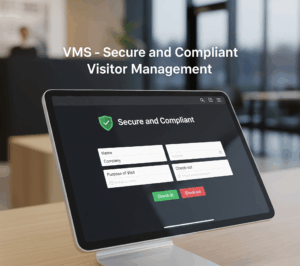
News & Updates

How Self-Service Kiosks in Healthcare Will Improve Patient Experience
As the demand for efficiency and personalised care grows across hospitals and clinics, these digital kiosks are emerging as essential touchpoints that streamline registration, payment, and information access.
The latest kiosks, equipped with AI- powered interfaces and robust integration with healthcare systems, put control into patients’ hands enabling them to manage appointments, check in quickly, and receive real-time updates throughout their visit. For healthcare providers, this shift promises more accurate data capture, operational efficiency, and a reduction in manual bottlenecks. Discover how leading institutions are leveraging this technology to deliver seamless experiences and elevate standards of care.
Streamlined Self-Registration and Check-In
Self-service kiosks have become the first touchpoint for patients entering clinics and hospitals. By automating check-in and registration, these kiosks eliminate the need for manual paperwork and reduce physical queues, providing a more efficient and private experience at the front desk. Patients are now able to quickly authenticate their identity, update personal information and confirm appointments without waiting for staff assistance. This not only empowers patients with greater autonomy but also reduces congestion during peak periods, creating a welcoming and stress-free environment.
Healthcare providers benefit significantly from this automation. Data captured at kiosks is more accurate and instantly synchronised with backend systems, minimising administrative errors and ensuring that patient records are always up to date. This digital approach also frees up healthcare staff to focus on patient care rather than repetitive administrative tasks, supporting a more efficient allocation of resources across the facility. The outcome is a smoother, faster, and more reliable check-in process that enhances the overall patient experience while driving operational productivity.
AI-Enabled Identity Verification
Modern self-service kiosks in healthcare increasingly leverage AI-driven technologies such as facial recognition and secure QR code scanning to verify patient identities instantly. This not only reduces the risk of human error but also streamlines the check-in process, minimising the need for direct staff intervention. Clinics in Singapore that have adopted automated ID verification have recorded a 30% decrease in administrative delays, particularly during high- traffic periods. The result is a significant improvement in patient flow and an elevated sense of security for both patients and providers.
Real-Time Appointment Sync
Integration between self-service kiosks and online appointment systems, such as ATT InfoSoft’s Online Resource Booking System (ORBS), allows patients to manage bookings on the spot. Patients can confirm, reschedule, or cancel appointments directly at the kiosk, with changes reflected in real time across backend schedules. This seamless synchronisation prevents double bookings and reduces the incidence of late arrivals, creating a more predictable and manageable waiting room environment. For both staff and patients, the result is a smoother, more transparent experience that supports timely care delivery.
Reducing Wait Times with Smart Queue Management
The integration of self-service kiosks with enterprise queue management systems (EQMS) is revolutionising how patient flow is managed in healthcare settings. By assigning queue numbers, providing estimated wait times, and delivering real-time notifications, kiosks help reduce perceived wait times and increase transparency for patients. This technological advancement not only enhances patient satisfaction but also enables providers to optimise staff deployment, ensuring resources are allocated where they are needed most throughout the day.
Kiosks powered by AI and smart automation adapt dynamically to patient demand, managing queues according to appointment type and priority. Real-time data collected by these systems empowers hospital managers to proactively adjust staffing levels and appointment slots, smoothing out peaks and troughs in demand. The result is a more efficient, responsive, and patient-centric approach to service delivery, supporting both operational excellence and high- quality care in busy healthcare environments.
Automated Queue Allocation
AI-enabled kiosks assign patients to service counters based on the urgency of their visit and appointment category. This dynamic allocation ensures that urgent cases are prioritised while routine visits are managed efficiently. Studies have shown that automated queueing can
lower average wait times by up to 40% in busy outpatient clinics, directly impacting patient satisfaction and throughput. By removing the unpredictability of manual queue management, kiosks create a fairer and more transparent service journey for all patients.
Live Status Updates and Notifications
Through real-time SMS or app notifications, patients are kept informed about their position in the queue and estimated waiting times. This transparency allows patients to wait more comfortably or even attend to other tasks nearby, reducing anxiety and frustration.
Importantly, such features also decrease crowding in waiting areas, supporting infection control measures that remain critical in healthcare settings. Patients appreciate the control and reassurance provided by these live updates, reinforcing trust in the healthcare provider.
Data-Driven Resource Planning
Self-service kiosks integrated with queue management systems collect granular data on patient arrivals, service durations, and peak periods. This information enables hospital managers to make informed decisions about staffing and appointment scheduling, ensuring that resources are aligned with actual demand patterns. Over time, data-driven planning helps healthcare providers forecast busy periods, optimise operational workflows, and maintain consistently high service standards, all while improving the quality of patient care delivered.
Enhancing Payment Experience and Transparency
Self-payment kiosks are transforming the billing process in healthcare by providing a fast, secure, and convenient way for patients to settle their accounts. By supporting multiple payment formats such as cards, mobile wallets, and e-wallets kiosks eliminate the need for patients to queue at traditional payment counters. This not only speeds up transactions but also reduces the risk of errors and enhances the overall transparency of the payment process. Automated receipts and clear billing breakdowns foster trust between patients and providers, while also minimising disputes and administrative follow-up.
For healthcare organisations, integrating payment kiosks with backend systems streamlines reconciliation and audit processes, supporting compliance with industry standards. The adoption of digital payment solutions is particularly valuable in high-volume environments, where it is crucial to maintain both speed and accuracy. Clinics that have implemented self- payment kiosks report a noticeable reduction in billing counter queues and improved patient satisfaction with the financial aspect of their care journey.
Automated Invoicing and Receipts
Once a payment is made, patients receive instant digital or printed receipts that detail services rendered and associated charges. This automation minimises the potential for human error in billing and supports audit readiness by ensuring all transactions are logged accurately. Automated reconciliation aligns with ISO-certified healthcare standards, providing an added layer of transparency and accountability that benefits both patients and providers.
Supporting Secure Visitor Management and Compliance
Visitor management in healthcare has become increasingly sophisticated, with self-service kiosks playing a vital role in supporting security and regulatory compliance. These kiosks facilitate automated check-in for visitors, capturing accurate information and minimising manual handling critical for infection prevention and efficient flow in high-traffic facilities.
Real-time location tracking and digital consent capture further enhance safety and regulatory compliance, providing both operational and reputational benefits for healthcare organisations.
By maintaining accurate visitor logs and supporting contact tracing efforts, kiosks help healthcare providers respond rapidly to security or health incidents. Automated alerts for overstays or unauthorised access bolster on-site safety, while comprehensive digital records ensure that facilities can meet stringent audit requirements. As healthcare regulations evolve, self-service kiosks offer a robust platform for maintaining compliance and demonstrating a commitment to patient and visitor safety alike.
Touchless Visitor Registration
Visitors can now register at kiosks using identity cards or QR codes, significantly reducing the need for manual handling and face-to-face interactions. This touchless approach supports infection control protocols by limiting physical contact and streamlining the registration process. Facilities can maintain detailed, up-to-date visitor logs, which are invaluable for contact tracing and retrospective security reviews, ensuring compliance with local health and safety regulations.
Integrated Compliance Tracking
Every visitor entry and exit is logged automatically by the kiosk system, creating a comprehensive audit trail that is essential for regulatory compliance. Automated alerts notify staff of any overstays or unauthorised access attempts, enabling swift intervention to uphold security standards. This integration of compliance tracking within visitor management not only reduces administrative workload but also reinforces a culture of safety and accountability within healthcare settings.
Personalising Patient Engagement and Information Access
Beyond administrative functions, self-service kiosks are becoming interactive platforms for patient engagement, education, and feedback. Patients can access personalised care instructions, review health information, or provide feedback on their experience all from the kiosk interface. Multi-language support and accessibility features ensure that these benefits are available to all, regardless of language or ability, promoting equity and inclusion in healthcare delivery.
By offering on-demand information and real-time feedback channels, kiosks empower patients to become more active participants in their care journey. This technology-driven engagement supports better health outcomes and continuous service improvement, as providers can quickly identify and respond to patient needs. In multicultural environments such as Singapore and Australia, the ability to communicate in multiple languages and accommodate diverse accessibility requirements is especially valuable.
Multi-Language and Accessibility Features
Self-service kiosks offer comprehensive language options and accessible interfaces for users with disabilities, ensuring that no patient is left behind. Such inclusivity is fundamental in multicultural healthcare contexts, enabling providers to serve a broad patient base effectively. Features like text-to-speech, adjustable font sizes, and intuitive navigation help create a welcoming environment for all users.
Instant Feedback and Service Ratings
Patients are encouraged to rate their experience or submit suggestions directly via the kiosk.
This immediate feedback loop allows healthcare providers to address issues promptly and monitor satisfaction trends over time. The ability to gather and act upon real-time feedback is key to maintaining high service standards and fostering a culture of continuous improvement.
On-Demand Health Information
Interactive displays at kiosks give patients access to educational materials, appointment reminders, and follow-up instructions tailored to their individual needs. This on-demand information supports informed decision-making and encourages self-care, helping patients feel more empowered and engaged in their treatment journey.
Building a Future-Ready Patient Experience in Healthcare
Self-service kiosks are set to be at the heart of a healthcare experience that is faster, safer, and more responsive to patient needs. From seamless self-registration to transparent payments and accessible health information, kiosks are driving operational improvements and setting higher standards for patient satisfaction. Healthcare providers that embrace these technologies are not only meeting the expectations of today’s patients but also building the foundations for continuous service innovation and compliance. To discover how ATT InfoSoft’s enterprise IT solutions can help your organisation create a future-ready patient experience, get in touch today.
Ready to find out more? Connect with ATT InfoSoft at infosoft-sales@attsystemsgroup.com
Send us a message
Contact Information
Address:
35 Ubi Crescent, ATT Building, Singapore, 408585
Phone:
Email:
Website:
www.attsystemsgroup.com





